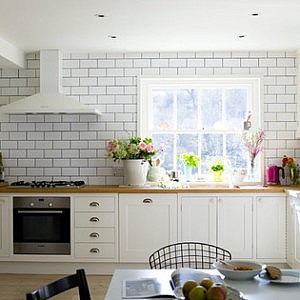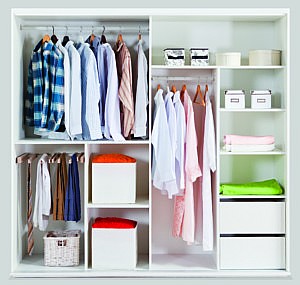Interview with a Professional Organiser: Lynda Wylie
We love to speak to our members and find out what a typical day looks like for them, to give a real insight into the life of a professional organiser, and their challenges, successes and motivations. Today's interview is with Lynda Wylie of Tidy Rooms in Surrey. Lynda tells us about her business, and the impact that getting organised can have on a home.Lynda Wylie of Tidy Rooms
What is your favourite thing or area to organise?
I love getting stuck into a kitchen declutter. It's one of those places where I find small changes make a big impact. As the hub of most homes, there are a lot of comings and goings - people, post, food, paperwork and more. Whether you're hungry, in a rush, or just looking for an important piece of paper, you usually need to lay your hands on something fast and easily. Being organised in the kitchen reduces stress and frustration and makes it a pleasant environment in which to spend time with your family and friends.
What prompted you to set up your business?
I was looking to return to work after having children and, after lots of job interviews which didn't come to anything, I decided to have a shot at running my own business - the question was, what? I was reading a book at the time where the main character helped her friend declutter her wardrobe and I thought, 'I could do that, I wonder if anyone else does it?'. As soon as I googled decluttering, I came across APDO and couldn't believe there was a whole professional industry blossoming in the UK. I jotted down a few ideas and Tidy Rooms was born! I even found a friend prepared to be a guinea pig, so I could try out my idea first. Nine years later and I'm still here and loving what I do!Who has influenced you most in your organising business?
Julie Morgenstern is an American organiser who wrote Organising from the Inside Out in 1998. Her book was the first one I read after deciding to become a professional myself. Her SPACE formula is the basis of how I work with clients and formalised what I already did naturally. Her book really helped clarify my processes and procedures and I continue using it to this day.What has been the biggest challenge that you have faced in your business?
One of the biggest challenges has been having the courage to give talks about decluttering. I get incredibly anxious about speaking to groups, but I've found that once I get started, I love the topic so much it flows very easily. The very first few talks I did alongside a colleague which helped my confidence immensely and since then I've given talks on my own and even enjoyed them!What benefits do your clients experience through becoming more organised?
Clients often tell me how much quicker and easier it is to do day-to-day tidying once a room's been decluttered. It's much easier for them to find things and put them away again. Plus, it often saves them money: they can see how much they have of something so they don't buy duplicates, they use up their supplies and they even sell things they discover they no longer need. They also mention a greater sense of calm because there's less clutter and unmade decisions surrounding them. This helps them think more clearly, rest and enjoy spending time at home. It can impact the whole family and many clients have said it's been a life changing experience for them.When you are going to a client, what essentials are in your toolkit?
I always take coloured bags to help us distinguish rubbish/recycling/charity, a labelling machine for neat sticky labels, wipes/duster to clean as we go, sticky notes and scissors. Oh, and a cereal bar to keep me going!What's the most memorable collection that you have ever seen? And what did you and your client do with it?
I had a client who collected brand new £5 notes. She had a big pile of them, but the clever thing was she would give one to her nephews whenever she saw them, so although it seemed strange to collect current notes, she had a purpose for them and was gradually working through them!What's the best outcome you've ever seen?
It's fantastic when you have the opportunity to declutter and organise a whole house. The impact on the client can be so far reaching, it's even life changing. I've been working with a client for the past 2 years who relocated to London and needed help deciding the purpose of her rooms and arranging their layouts as well as contents. Everything from the kitchen, to part of the garden, to the basement and the library. Seeing the whole house gradually evolve to meet her family's needs and her excitement and delight as rooms were transformed, has been such a privilege and a pleasure. She's been able to redecorate, make money from the sale of furniture, have guests to stay, even plan an extension. She's grown in confidence to organise on her own, thinks differently about her space and finds living at home much less stressful.
Who's your dream client? Who do you most like to help?
My dream client is someone who knows they need change but they're not sure what or how to do it. Working together we look at how they live in their space and what changes will turn it into a home which meets their current needs. It's a real honour to share this process with them and guide them through decision making, helping them reflect on how they live and what they have. Decluttering and organising is so much more than just the stuff, you really get to know your clients and often their families too. I think the clients who are open to trying new ways of living, whether that's tackling their stuff, changing habits or developing systems, they are the ones who experience the most benefit from the journey and I love sharing it with them.What's your top tip to share?
There are so many, it's really hard to pick just one! I'd say grouping similar items together is often a game changer for my clients. This means storing all your similar items together. So for example, in the kitchen, it's putting all your cleaning products in one place, all your cups in one cupboard, all your cookery books on one shelf. That way you can see what you have, what needs using up, what's missing, how much storage you need and more. It's a technique to use all over your home, in every room and will help define your spaces and rationalise your stuff so you can be more organised.If you are considering a career in professional organising like Lynda, you can find out more about APDO's training courses here - or sign up for the APDO Conference on 20 May 2021. Or if you'd like some help to get organised at home you can find your nearest organiser here.
